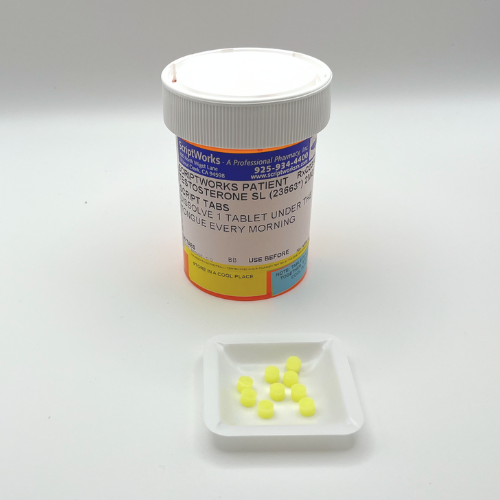
Author: Bob Brensel | President, Pharmacist | ScriptWorks
Bob Brensel, RPh, earned his Pharmacy Degree at University of the Pacific in Stockton, California in 1980. Former California Pharmacists Association’s Award Winner for Recognition of Outstanding Achievement in Compounding Pharmacy. Read More →
How Sublingual Testosterone Tabs May Support Energy & Stamina
As more and more of our population of women are aging to menopausal age, bioidentical hormone replacement therapy (BHRT) continues to gain momentum. Among various formulations, sublingual testosterone tablets — dissolved under the tongue — emerge as a discreet, fast-acting option. Let’s explore why they are recommended to address diminished energy and stamina for California menopausal women.
As more and more of our population of women are aging to menopausal age, bioidentical hormone replacement therapy (BHRT) continues to gain momentum. Among various formulations, sublingual testosterone tablets — dissolved under the tongue — emerge as a discreet, fast-acting option. Let’s explore why they are recommended to address diminished energy and stamina for California menopausal women.
How Does Testosterone Decline During Menopause Affect Women?
As women age — particularly during perimenopause and menopause — natural testosterone levels tend to decline. In some cases, this drop may contribute to symptoms like fatigue, low stamina, mental fog, reduced motivation, and low sexual desire.
Energy, Mood, and Vitality
Testosterone plays a role in women’s mood regulation and overall sense of vitality. Declining testosterone levels, particularly during perimenopause and menopause, have been associated with symptoms such as fatigue, decreased motivation, and mood disturbances. Some studies suggest that testosterone therapy may support improvements in mood and energy levels:
- A pilot study found that testosterone therapy over four months was associated with significant improvements in mood and cognitive symptoms among peri- and postmenopausal women. Source: Women’s Mental Health
- Another study indicated that testosterone influences libido and well-being in women, highlighting its potential impact on mood and vitality. Source: Trends in Endocrinology & Metabolism
Muscle and Bone Health
Testosterone contributes to the maintenance of muscle mass and bone density in women. Lower levels of testosterone have been linked to decreased muscle strength and an increased risk of osteoporosis. Research findings include:
- A study analyzing data from the National Health and Nutrition Examination Survey (NHANES) 2011–2016 found a positive association between testosterone levels and lumbar bone mineral density in women aged 40–60 years. Source: Scientific Reports
Sexual Health and Testosterone in Menopausal Women
Testosterone may play a role in supporting sexual health in menopausal women. Declining levels of testosterone during menopause have been associated with changes in libido, arousal, and overall sexual well-being. Some research suggests a potential link between testosterone levels and sexual function:
- A cross-sectional analysis of midlife women from the Study of Women’s Health Across the Nation (SWAN) observed that lower levels of bioavailable testosterone were associated with decreased sexual desire and arousal. These findings suggest testosterone may be a contributing factor in maintaining aspects of sexual health during the menopausal transition. Source: The Journal of Clinical Endocrinology & Metabolism
- According to international guidelines, testosterone may be appropriate for women with Hypoactive Sexual Desire Disorder (HSDD) under controlled dosing and medical oversight.
Understanding BHRT: Where Sublingual Testosterone Fits In
Bioidentical Hormone Replacement Therapy (BHRT) refers to the use of hormones that are chemically identical to those produced naturally in the human body. These hormones — commonly including testosterone, estrogen, and progesterone — are often derived from plant sources and then synthesized to match human hormones at a molecular level.
Unlike conventional hormone replacement therapies (HRTs), which may use synthetic or animal-derived hormones, BHRT aims to mirror the body’s own hormone structures. Some practitioners who seek to personalize hormone restoration based on detailed lab testing and individual symptom profiles favor this approach.
Healthcare providers may consider BHRT-based testosterone replacement when:
- A woman presents with symptoms associated with low testosterone
- Lab testing confirms sub-physiologic testosterone levels
- Learn more about At-Home Hormone Test Kits >>
- Standard therapies (e.g., antidepressants, stimulants) have limited benefit
- The goal is to support quality of life, not just address a disease
How Sublingual Testosterone Tablets Fit Into BHRT
Sublingual testosterone tablets or tabs — custom-compounded to low doses — are a common delivery method within BHRT. Patients place these tabs under the tongue, where the hormone is absorbed directly into the bloodstream, bypassing the liver’s first-pass metabolism. This route allows for:
- Faster absorption
- More consistent blood levels (compared to oral dosing)
- Flexible, individualized dosing
Since there are no FDA-approved testosterone formulations specifically for women in the U.S., compounding pharmacies play an important role in making BHRT accessible. These pharmacies work with licensed prescribers to create custom doses tailored to the unique hormonal needs of each patient.
By targeting hormone imbalances that may contribute to fatigue or diminished vitality, sublingual testosterone tabs offer a personalized BHRT approach that may support energy and stamina in women — particularly those navigating midlife hormonal changes.
Why ScriptWorks’ Testosterone Sublingual Mini Script Tabs (Tablets) Stand Out
For providers and patients seeking quality compounded BHRT options, ScriptWorks’ Testosterone Sublingual Mini Script Tabs (Tablets) offer distinct formulation advantages. ScriptWorks prepares each batch in a PCAB-accredited compounding facility, ensuring consistency, dosing accuracy, and pharmaceutical-grade quality.
For women experiencing symptoms such as low energy, reduced stamina, or diminished sense of vitality—particularly during perimenopause or menopause— ScriptWorks’ Testosterone Sublingual Mini Script Tabs offers high quality via a small, convenient delivery method for low-dose, bioidentical testosterone as part of a broader BHRT protocol.
We designed their small form factor to dissolve efficiently under the tongue, supporting faster absorption while avoiding the digestive tract. When used under medical supervision and guided by lab work, sublingual testosterone may support improvements in overall wellness, mood, and physical performance in some individuals.

For women experiencing symptoms such as low energy, reduced stamina, or diminished sense of vitality—particularly during perimenopause or menopause— ScriptWorks’ Testosterone Sublingual Mini Script Tabs offers high quality via a small, convenient delivery method for low-dose, bioidentical testosterone as part of a broader BHRT protocol.
Their small form factor is designed to dissolve efficiently under the tongue, supporting faster absorption while avoiding the digestive tract. When used under medical supervision and guided by lab work, sublingual testosterone may support improvements in overall wellness, mood, and physical performance in some individuals.

Mechanism of Action – Sublingual Testosterone
- Administration: Testosterone is placed under the tongue (sublingual).
- Absorption: The medication dissolves and is absorbed through the rich blood vessels under the tongue.
- Bypasses Liver First-Pass: This route avoids first-pass metabolism by the liver, allowing more of the hormone to enter systemic circulation directly.
- Systemic Distribution: Once absorbed, testosterone circulates through the bloodstream and may bind to androgen receptors in various tissues.
- Physiologic Effects: Testosterone may influence libido, mood, muscle mass, bone density, and energy levels by modulating gene expression through androgen receptors.
A pharmacokinetic study involving healthy premenopausal women demonstrated that sublingual administration of testosterone (0.25–0.75 mg) resulted in dose-dependent peaks of free testosterone within 15 minutes, with levels returning to baseline approximately 150 minutes post-administration.
Further research observed that a single 0.5-mg dose of sublingual testosterone led to rapid increases in circulating testosterone within 15 minutes, returning to baseline after 90 minutes. These hormonal changes were associated with enhanced physiological and subjective sexual arousal in women.
Safety & Monitoring: Essential Considerations
Studies report minor side effects like acne and mild hair growth, with no serious adverse events when physiologic levels are maintained. However, potential lipid alterations — specifically modest HDL reduction — prompt periodic monitoring.
Key monitoring includes:
- Serum testosterone levels
- Liver function tests
- Lipid profiles
- Signs of androgen excess (acne, hirsutism)
Compassion for Your Symptoms, Ready to Find the Right Solution
For California women navigating fatigue, brain fog, or lowered endurance, sublingual testosterone tabs — under medical supervision — may represent a meaningful tool. It’s not a panacea, but when carefully dosed and monitored, it may help restore balance.
For practitioners: adopt a personalized, evidence-informed pathway — starting low, monitoring closely, and keeping safety front and center. Collaboration with Scriptworks, a highly reputable compounding pharmacy, elevates your practice with innovative options, with precise dosing and quality.
References:
- Kohl, T., et al. (2017). Benefits & harms of flibanserin and testosterone for treatment of low libido in menopausal women. OHSU. Link
- Davis, S. R., Baber, R., Panay, N., et al. (2019). Global consensus position statement on use of testosterone therapy for women. Climacteric, 22(5), 429–434. Link
- Islam, R. M., Bell, R. J., Green, S., Page, M. J., & Davis, S. R. (2019). Safety and efficacy of testosterone for women: systematic review & meta‑analysis. The Lancet Diabetes & Endocrinology, 7(10), 754‑766. Link
- Clayton, A., et al. (2018). The International Society for the Study of Women’s Sexual Health process of care for management of HSDD in women, 93(4), 467‑487. Link
- Tuiten, A., et al. (2000). Time course of effects of testosterone administration on sexual arousal in women. JAMA Psychiatry. Link
- van Rooij, K., de Leede, E., et al. (2011). Pharmacokinetics of three doses of sublingual testosterone in healthy women. Steroids, 76(7), 774‑778. Link


